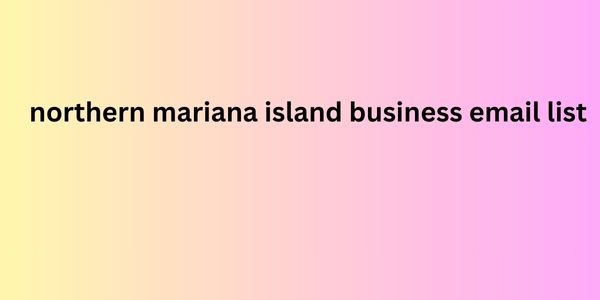Websites Are The Future
Our future is technology. Even just northern mariana island business email list looking at the changes brought about by COVID-19 and the subsequent transitions to online functionality reveals the rise of E-commerce and the newfound importance of investing in digital interfaces. Interestingly, a recent report from Top Design Firms can understand the need for a website, which reveals that 71% of small businesses have one. Given that most companies are shifting towards a greater online presence, those who are still making the shift, must understand the key steps involved to create an effective website.

Good Domain Name
Whenever you look for a website, you commonly enter a web address into a web browser address bar. This is known as a domain name. A domain name lends instant legitimacy to your company and places you in the same online marketplace as your major rivals. When first creating your website, it is incredibly important that you choose a relevant, catchy, and simple domain name that will appeal to your consumers and serve as a good representation of your organization for many years. Part of your brainstorming process should be to look up available domain names.
Additionally, your company name should be in your web address, which should be relatively straightforward to ensure it is easily recognized and recalled when searching for your business. The domain itself can include any combination of letters and digits, although using obscure characters can be difficult for consumers to memorize. To create a domain name, you can visit a range of websites such as WordPress and GoDaddy.
Building Your Website
When first starting your website, it is important to create or follow a website-building checklist. After registering your domain name, it is time to set up your website by choosing a website host. A website hosting provider is a company that offers the technology and services necessary for consumers to view a website on the internet. Web hosting services provide the space for your website to live for others to visit, meaning having a hosting package is a necessary part of the process. Different hosting platforms offer different benefits or characteristics, so you must research which provider suits you and your needs best. Some providers allow for increased loading speeds and increased storage, meaning you can integrate videos into your website seamlessly. Some website host providers include Bluehost and Hostinger.
E-commerce Platforms
The next step to creating your functional website is engaging an e-commerce provider. If you are looking to sell products or services via your website, you will need the right technology. For users to transact with you online financially, you must research the right platform that meets your business model. One important factor to consider when choosing an e-commerce provider is its emphasis on secure and protected transactions. If by any chance, your consumers are hacked or have their details stolen, your company and website will not only lose credibility but also lose other customers. There is a range of platforms available to choose from, such as Shopify, WooCommerce, and Business Squarespace, all of which vary in various ways, such as level of customization, payment methods, and subscription costs.
You Need a Content Manager System
So, by now, you’ve got a website, it has a host, and people can engage in transactions, now what? Next, you’ll need to start thinking about your content manager system (CMS). It is easy for consumers to feel overwhelmed with online marketing and advertising campaigns in today’s day and age, so your website must be well-managed to avoid chaos. CMS is computer software used to manage the creation and modification of digital content, allowing you to easily generate, manage, change, and publish material using a user-friendly interface without needing to code. This means investing in a CMS is a must! By doing so, you avoid all coding issues, allow for easy collaboration, access SEO features, and extensions, use pre-designed templates, and make simple updates. Popular CMS platform providers include CMS Hub and Joomla. However, businesses must research to find the provider that suits their website most.
Some Features Are a Must
The design of your website matters more than anything, and if the groundwork isn’t put in early, your website will fail. There are several consistent key features when looking at any regular website, almost like a website criteria checklist. For example, key tabs such as ‘About Us,’ ‘Contact Information,’ and ‘Privacy Policy’ must always exist. Furthermore, links to social media are now also essential for increasing website traffic and sharing specific information. In the digital world of e-commerce, social media is the new frontier, and businesses can establish their digital presence and reinforce brand image and personality like never before. Lastly, nowadays, many websites benefit from providing details about their company vision, mission, or central values, as this information has a greater influence on consumers purchasing decisions. For example, consumers are more likely to engage with your brand if it aligns with their values, such as sustainability or ethical resourcing.
